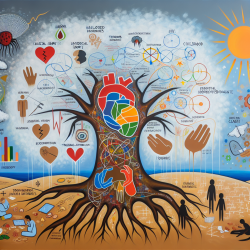The intersection of human rights and drug control policies presents a complex landscape that practitioners in the field must navigate with care and precision. The recent research article, "International Guidelines on Human Rights and Drug Control," highlights the critical need for integrating a gender perspective into these policies to ensure the protection of women's rights. This blog post aims to provide practitioners with actionable insights from the research to improve their skills and encourage further exploration in this vital area.
The Importance of a Gender Perspective
The research underscores the necessity of incorporating a gender perspective in drug control efforts. Historically, women have faced disproportionate challenges in the context of drug use and trade. These challenges are compounded by intersecting factors such as poverty, race, and social inequality, which often result in discriminatory practices against women.
Practitioners can enhance their skills by understanding how gender roles and stereotypes influence women's experiences with drugs. This understanding is crucial for developing interventions that address the unique needs of women who use drugs or are involved in the drug trade. By acknowledging these factors, practitioners can advocate for policies that provide equitable access to health care and social services for women.
Implementing Human Rights-Based Approaches
A human rights-based approach to drug control emphasizes the need for policies that respect, protect, and fulfill women's rights. Practitioners should be aware of international human rights obligations that call for non-discriminatory access to health care services, including those related to pregnancy and reproductive health.
- Advocate for harm reduction services that cater specifically to women's needs.
- Promote legal reforms that protect women from punitive measures related to drug use during pregnancy.
- Support initiatives that provide alternatives to incarceration for non-violent female offenders involved in drug-related offenses.
By implementing these strategies, practitioners can contribute to a more just and equitable system that recognizes the distinct experiences of women in the context of drugs.
Encouraging Further Research
The research highlights several areas where further investigation is needed. Practitioners are encouraged to explore topics such as:
- The impact of intersecting forms of discrimination on women involved in the drug trade.
- The effectiveness of alternative development programs in addressing gender-specific barriers.
- The role of international guidelines in shaping national drug policies that uphold women's rights.
By engaging in further research, practitioners can contribute to a growing body of knowledge that informs policy development and implementation at both national and international levels.
Conclusion
The integration of human rights into drug control policies is essential for ensuring that women's rights are protected and upheld. Practitioners play a pivotal role in this process by advocating for gender-sensitive approaches and engaging in ongoing research. By leveraging the insights from "International Guidelines on Human Rights and Drug Control," practitioners can enhance their skills and make meaningful contributions to this critical area.
To read the original research paper, please follow this link: International Guidelines on Human Rights and Drug Control.










